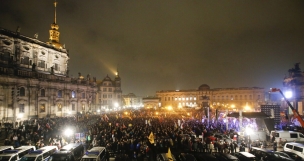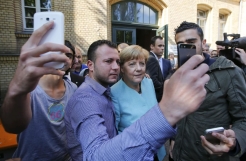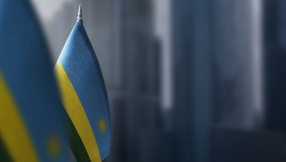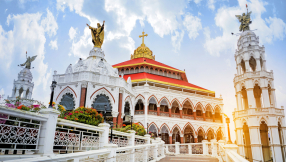When Time magazine chose Angela Merkel for their Person of the Year 2015, they placed a large picture of her on the front page and a full-length profile inside. Surprisingly – or perhaps not – the profile's 9,000 or so words hardly mentioned the German Chancellor's Christian faith. Merkel is not a soap-box politician. She does not specialise in big visions. She measures, weighs, hesitates, and then finally acts. She prefers to lead, as the phrase goes, from behind. All this means that, unlike say Margaret Thatcher, which whom she has been often compared, she does not go in for candid professions of her Christian faith. Yet, from occasional remarks she has made over the years, it seems that Merkel's Christianity is deep, genuine and important.
Merkel's father, Horst Kasner, was a Lutheran pastor and theologian, who, very unusually, moved into East Germany in 1954, when his daughter was six, just as thousands were moving Westwards. Kasner felt some sympathy with East Germany state socialism (or at least with what it was ostensibly trying to achieve) although that did not preclude his family from intense surveillance from a government that was deeply hostile to faith and freedom.
Merkel grew up in a house with a church-run centre for people with mental and physical disabilities. She was heavily influenced by her father, although primarily by his "logical rigour" which she took into her early career as a chemist. Edging her way into politics after the fall of the Berlin Wall, she was appointed as a minister by Chancellor Helmut Kohl, who recognised her talent but also wanted a Protestant woman from the East to help balance his cabinet of largely Roman Catholic men.
For all that she might be an outsider to her party, Merkel speaks its language. The Christian Democratic Union openly talks of the Christian ethic, and in particular the Christian valuing of humanity made in the image of God, as its foundation for politics. Merkel has echoed such sentiments, allowing critics to claim that her faith is mere window dressing by a politician who needs to appeal to the more traditional, Catholic elements in her party.
This is undoubtedly the truth, but not the whole truth. Occasionally, Merkel offers glimpses of her more personal faith. "I am a member of the evangelical church. I believe in God and religion is also my constant companion, and has been for the whole of my life," she told a theology student on a videoblog interview in 2012. "We as Christians should above all not be afraid of standing up for our beliefs," she continued.
Precisely how that shapes her politics is unclear. Merkel does the 'Christian moral framework' thing, just as Gordon Brown (and, much more implicitly, Tony Blair and David Cameron) did. But she has accepted invitations to speak at the International Meeting of Prayer for Peace (could one envisage a British Premier doing that?), and asked for the meeting's prayers for the Euro crisis. She also spoke at the German Evangelical Church's annual synod urging Germany's Protestant and Roman Catholic churches to stress their common beliefs in the challenging run up to the 2017 Reformation anniversary.
Perhaps most tellingly, in the increasingly tense debate over Islam in Germany, Merkel has not circumvented the thorny issue of religion. While analysts feel that her extraordinarily generous (others have said foolhardy, or criminally negligent) response to the refugee crisis was due more to her East German upbringing, fostering a deep sense for the importance of free movement, rather than her Christian one, she has still articulated a moral angle to the problem. "If we not have to start apologising for showing a friendly face in response to emergency situations, then that's not my country". Moreover, she has argued that the proper response Muslim migration is not some mythically-neutral secularism, still less the kind of Islamophobia increasingly evident in sections of German society, but a securer grasp of Christian faith, declaring that Germany suffers not from "too much Islam" but "too little Christianity".
The sentiments are controversial. But then so is virtually everything that a politician of Merkel's standing does. For all her privacy, pragmatism and hesitation, Merkel shows glimpses of principled steel that are connected to her private, but sincere Christian faith.
Nick Spencer is Research Director at Theos, which is running a series of essays on the Christian faith of global political leaders. His book The Evolution of the West will be out in 2016.















